FinCity Global ForumFuture of Asset Management and Tokyo as a Global Financial City
FinCity.Tokyo held an international symposium “FinCity Global Forum- Future of Asset Management and Tokyo as a Global Financial Cities” on the theme of global financial cities and asset management on Thursday, March 19, 2020. This event is the first international symposium by a public-private promotion organization established in April 2019 as an entity that promotes the vision of global financial city.
In recent years, in addition to the declining birthrate and aging population in Japan, the outlook for the global economy has become increasingly uncertain, and there is growing interest in the active utilization of asset management by individual and institutional investors.
At this event, we discussed why asset management is now important, what issues should be addressed in order to advance the asset management industry, what kind of society we aim to achieve through the utilization of asset management with opinion leaders from related authorities, investors, asset management companies and listed companies.Supported by FinCity.Tokyo
Opening Remarks
Global Financial City: Tokyo Vision
Superb opportunity to realize the vision of Tokyo as a global financial center
The Tokyo Metropolitan Government is spearheading a “Global Financial City: Tokyo” initiative. It is an ambitious project to promote more effective use of household financial assets for Japan’s sustained economic growth by turning the capital into a sophisticated international financial center that contributes to tackling the key social and economic challenges confronting the nation.
The global financial landscape is undergoing some radical changes, including Britain’s exit from the European Union. This fluid financial situation offers a great opportunity for Tokyo to realize the vision for its future as a global financial hub, since it offers a stable and reliable business environment for the financial services sector. The three priorities of the initiative are: (1) promoting more sophisticated asset management; (2) making Tokyo markets better equipped to serve as a key nexus of flows of domestic and international money; (3) boosting international cooperation for stronger and more integrated core financial infrastructure. Tokyo as a prominent global financial center would be able to help address the wide range of challenges facing Tokyo and the rest of the nation.
Hiroshi Nakaso Chairman, FinCity.Tokyo
Download documents <Japanese only>

Keynote Speech – 1
Asset Management and Tokyo International Financial Center
A path to the future for the asset management industry
The Financial Services Agency’s principal mission in its regulatory and administrative operations is to ensure “an increase in the wellbeing of the people through the promotion of sustained growth of companies and the economy and stable asset formation.” The asset management industry has a vital role to play for the accomplishment of this goal. It has become clear that the industry should focus on four key strategic priorities.
First, asset management companies should establish a governance system designed to maximize customer profits as the top priority and ensure its functionality. Secondly, they should be managed by a team of people who are well versed in the asset management business and committed to placing the greatest importance on customer profits from a long-term perspective. Thirdly, they need to lay out clear long-term visions for their businesses and develop and execute specific strategies for realizing them. They also have to improve their systems to evaluate the performances of executives and employees, offering fair compensation for their work, and upgrade their product governance including the process of creating financial products as well as their fund management operations. We are ready to engage in in-depth discussions on these issues with asset management companies.
Toshihide Endo Commissioner, Financial Services Agency (FSA)
Download documents <Japanese only>Keynote Speech – 2
Aiming at Development of Asset Management Industry
There are two key issues for the efforts to promote the development of the asset management industry. One is what are the requirements for a city to become an international financial hub. The asset management industry is the core of the functionality of such a city. The other is how to upgrade and refine the industry. There are three key concepts related to this issue: fiduciary duty, professionalism and quality.
Akiyoshi Oba Chairman, Japan Investment Advisers Association (JIAA)
Download documents <Japanese only>

Keynote Speech – 3
International Financial City Strategy and Creating Shared Value (CSV) Management
The global trend toward stakeholder capitalism is testing the effectiveness of the creating shared value (CSV) approach to management. Japan has its own unique tradition of business ethics, as manifested in the concept of sanpo-yoshi, or “good for all the three sides (the seller, the buyer and society)” and in Eiichi Shibusawa’s “Rongo to Soroban” (The Analects of Confucius and the Abacus). Japan can achieve great gains by introducing the Japanese-style corporate governance that has been created in the past five to six years to overseas audiences.
Charles D. Lake II Chairman and Representative Director, Aflac Life Insurance Japan Ltd./ President, Aflac International
Download documents <Japanese only>Panel Discussion – 1
Advancement of the Asset Management Industry and Global Financial City Initiative


Asset management companies should develop specialists.
Yasumasa Tahara Director of Strategy Development Division, Financial Services Agency (FSA)

Effective use of technology and diversity in human resources and work styles are crucial.
Kazuhide Toda Managing Executive Officer, Chief Investment Officer, Nippon Life Insurance Company

Make effective use of talented people irrespective of age.
Oki Matsumoto Chairman & CEO, Monex Group, Inc.
〈Moderator〉Emi Onozuka
Panel Discussion – 2
Regional revitalization through asset management and solutions to social issues


Yoshisuke Kiguchi Chief Investment Officer, West Japan Machinery Pension Fund

Ken Shibusawa Chief Executive Officer, Shibusawa and Company, Inc. Founder and Chairman, Commons Asset Management

Manabu Sato President and Representative Director, Regional Revitalization Solution
〈Moderator〉Futoshi Oguri Senior Staff Writer, Nikkei Inc.
In Panel Discussion 2, Oguri, the moderator, asked the panelists how it is possible to revitalize local economies through financial services and investments. Sato referred to “All-Japan Kanko Rikkoku Fund,” a fund to invest in projects to boost local tourist industries, and argued that financial institutions should play active roles in promoting communications between different regions in order to make more effective use of tourist resources in local areas. Kiguchi pointed out that managing local corporate pension funds requires developing investment strategies by obtaining the latest information about the world from asset management companies in Tokyo. He stressed the importance of Tokyo’s status as a major international city that attracts information from all over the world. Shibusawa said the world is on the cusp of a new era of impact investments, designed to help solve social problems while seeking economic returns. He argued that Tokyo should serve as the core of the ecosystem for the new era, emphasizing the importance of the capital’s intermediary functions of connecting regions to regions and regions to the world.
Panel Discussion – 3
Balancing competition and collaboration among international financial cities


Jochen Biedermann Managing Director, World Alliance of International Financial Centers (WAIFC)

Hubertus Vaeth Managing Director, Frankfurt Main Finance

Gary Stanton FCSI Secretary General, International Bankers Association of Japan (IBA)
〈Moderator〉Keiichi Aritomo Executive Director of FinCity.Tokyo
Panel Discussion 3 featured thee overseas experts as the panelists. Biedermann explained that Tokyo and 15 other international financial centers that are competing with each other have formed a partnership called the World Alliance of International Financial Centers to work together to promote investments and savings while supporting sustainable economic growth. Aritomo, the moderator, said enhancing asset management capabilities is urgently needed in Japan to make the most of the $18 trillion worth of household assets in this nation. Asserting that it is vital for Japan to attract outstanding foreign talent in this field, Vaeth stressed the importance for financial centers to learn from each other. Stanton described Japan as a market with high levels of liquidity and well-developed infrastructure for financial services and investment. He also said FinCity.Tokyo’s principal mission should be to provide information about Japan’s advantages as a financial hub to the overseas audience so that people in the rest of the world can understand them accurately.
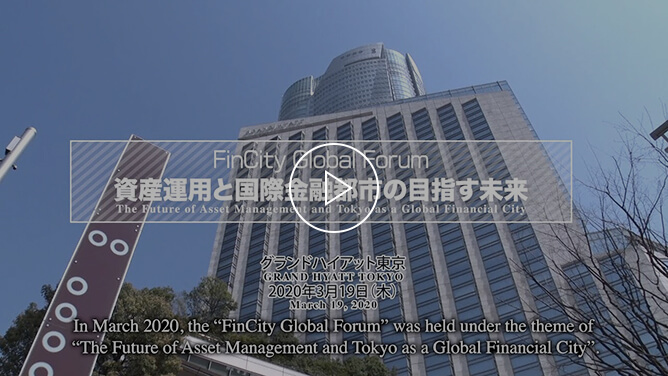
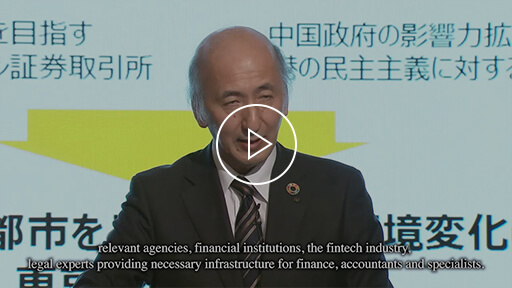
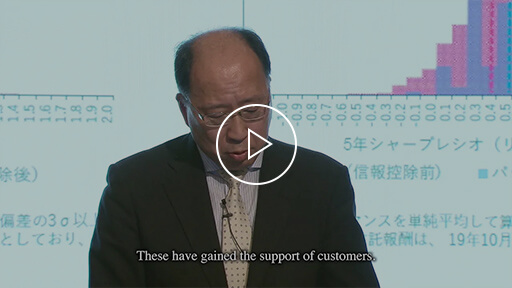
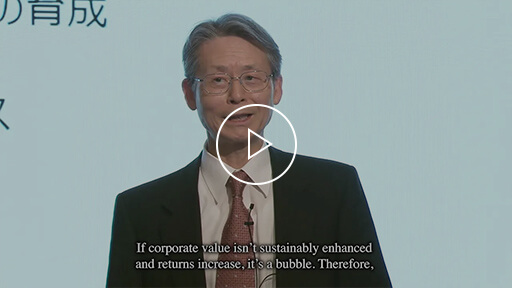
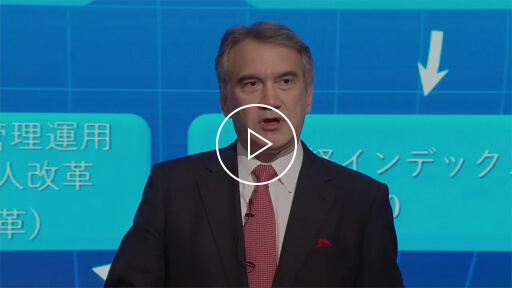
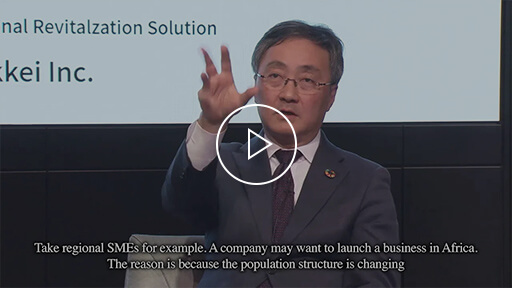
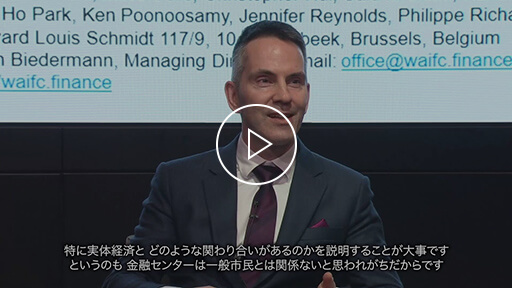
Onozuka
What’s the current situation concerning the investment value chain and what challenges need to be addressed?
Tahara
Ensuring that the investment value chain works properly and realizing the formation of assets for the people to revitalize the Japanese economy is a key financial policy goal. To upgrade the nation’s asset management industry to higher levels of sophistication, we need to attract more talent from abroad. From this point of view, the Tokyo Metropolitan Government’s “Global Financial City: Tokyo” initiative has huge implications for the future of the industry in Japan.
Matsumoto
It is vital to get more individual investors, who are key components of the investment chain, involved in this process. Japanese individual investors have a massive amount of assets and could have a high level of financial literacy. It is quite important to encourage individual investors to hold stocks over the long term by getting them to be interested not only in stock prices but also in the management of companies they have or may have stakes in.
Toda
Sustainability and investment returns can be compatible over the medium- and long-term. Life insurance companies have a strong affinity for ESG (environmental, social and governance) investing because they basically focus on long-term investment. We not only own Japanese stocks but also place much importance on engagement with companies we invest in to help them tackle their management problems.
Onozuka
What are your thoughts about the innovations in asset management that are required to make Tokyo a global financial center?
Toda
It is crucial to make strategic use of cutting-edge technologies like artificial intelligence and Big Data to realize more sophisticated asset management. New technologies are vital not just for management and analysis but also for sales, distribution and risk management.
Matsumoto
Human intelligence, which can gain insight into various phenomena that have yet to be translated into a set of data, is more important for engagement and shareholder activism. I myself have established an asset management company that collects money from individual investors for open-end investment trust funds for engagement with the firms they have invested in. We hope to make innovations in a broader sense in the Japanese capital market.
Tahara
Investment performance cannot be improved without innovation. I want to see Japanese financial institutions make more active and effective use of state-of-the-art technology. The Financial Services Agency intends also to provide policy support to efforts in the field of fintech.
Onozuka
What are your views about diversity in human resources in the industry?
Toda
Asset management companies have a wide range of operations, including explaining investment products to customers and risk management. That means they need to make good use of technology and ensure diversity in human resources and work styles. We have a growing number of cases in which fund managers have risen to senior executive positions while being involved in managing specific asset classes for years. We intend to accelerate this trend further.
Matsumoto
The biggest issue concerning diversity is not nationality or gender but age. The asset management industry needs to do better in capitalizing on qualified people irrespective of their ages.
Tahara
Asset management companies are grappling with some sticky challenges in their efforts to develop and tap human resources, such as the difficulty of reforming their compensation schemes, which are inevitably influenced by those of their parent companies. I’m keen to see them craft better personal management systems to develop a diverse workforce of qualified specialists.